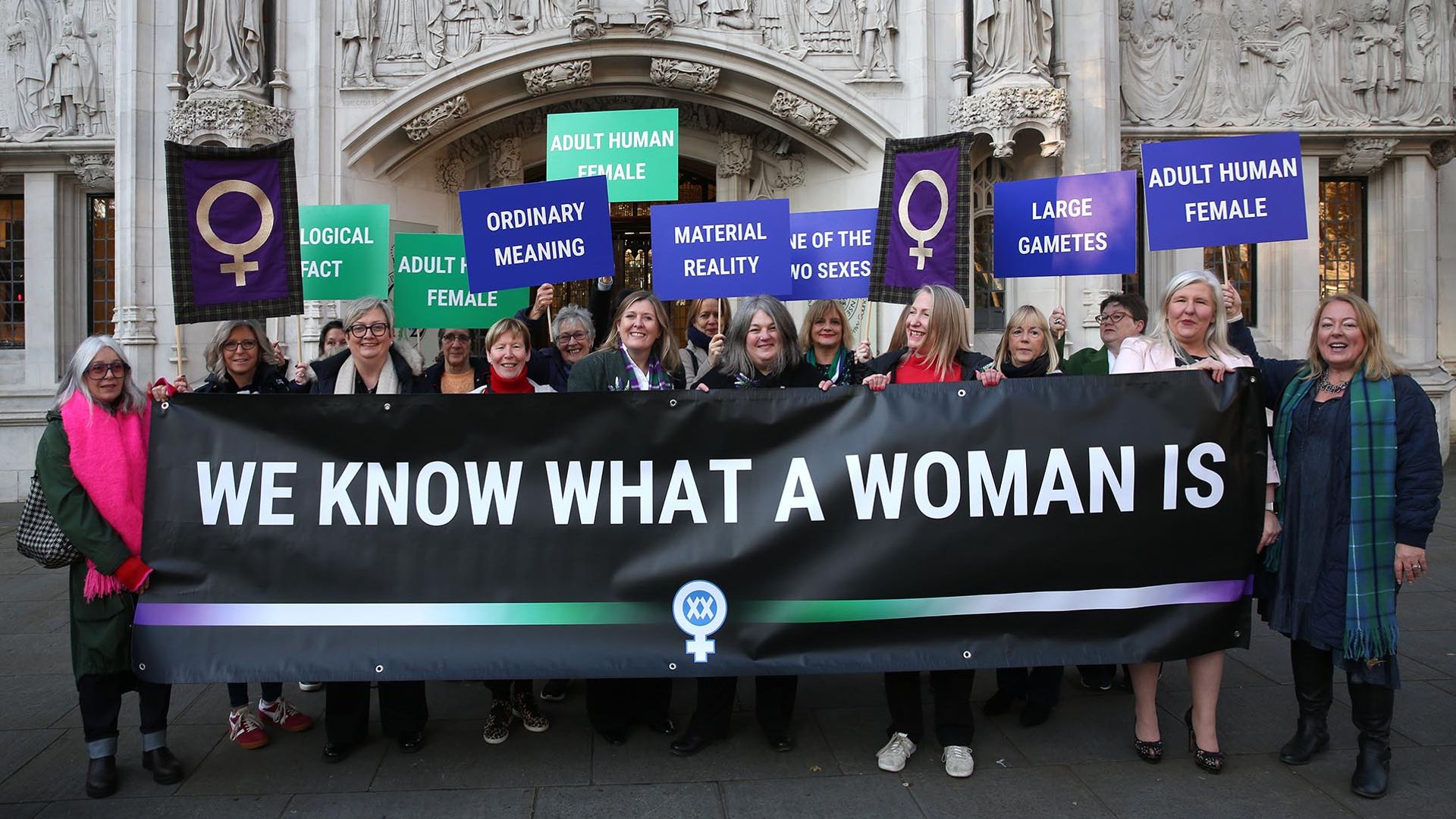Listeners:
Top listeners:
-
 play_arrow
play_arrow
RiseupRadio RiseupRadio UK
The UK Supreme Court has issued a landmark judgment on how a woman should be defined in law.
The long-running legal challenge centres around how sex-based rights are applied through the UK-wide Equality Act 2010.
They unanimously decided the definition of a “woman” and “sex” in the Equality Act 2010 refers to “a biological woman and biological sex”.
The judges were asked to rule on what that legislation means by “sex” – whether biological sex or “certificated” sex as legally defined by the 2004 Gender Recognition Act.

Campaigners from For Women Scotland ahead of the ruling on Wednesday. Pic: PA
Delivering the ruling at the London court on Wednesday, Lord Hodge said: “But we counsel against reading this judgment as a triumph of one or more groups in our society at the expense of another. It is not.
“The Equality Act 2010 gives transgender people protection, not only against discrimination through the protected characteristic of gender reassignment, but also against direct discrimination, indirect discrimination and harassment in substance in their acquired gender.
“This is the application of the principle of discrimination by association. Those statutory protections are available to transgender people, whether or not they possess a gender recognition certificate.”
More on Scotland
-

Woman, 72, and boy, 12, seriously assaulted during home invasion ‘linked to ongoing Edinburgh-Glasgow gang feud’
-

MSP James Dornan reveals attempted murder charge as teenager after success of Netflix show Adolescence
-

First Minister John Swinney defends near £20,000 pay rise for SNP ministers as ‘fair’
Related Topics:

Pic: Reuters
The case was brought against the Scottish government by campaign group For Women Scotland (FWS).
FWS called on the court to find sex an “immutable biological state”, arguing sex-based protections should only apply to people born female.
The Scottish government argued the protections should also include transgender people with a gender recognition certificate (GRC).
The ruling was made by Lord Reed, Lord Hodge, Lord Lloyd-Jones, Lady Rose and Lady Simler.
The long-running legal dispute
The legal dispute stems back to the Gender Representation on Public Boards (Scotland) Act 2018, which aimed to increase the proportion of women on public boards.
For Women Scotland (FWS) successfully challenged the original act over its inclusion of transgender women in its definition of “women”.
The Court of Session in Edinburgh ruled that changing the definition of a woman in the act was unlawful, as it dealt with matters falling outside the Scottish parliament’s legal competence.
The Scottish government dropped the definition from the act and issued revised statutory guidance.
This stated that under the 2018 Act the definition of a woman was the same as that set out in the Equality Act 2010, and also that a person with a gender recognition certificate (GRC) recognising their gender as female had the sex of a woman as per the 2004 Gender Recognition Act.
FWS challenged the revised guidance on the grounds sex under the Equality Act referred to its biological meaning and said the government was overstepping its powers by effectively redefining the meaning of “woman”.
The group argued the guidance could have implications for the running of single-sex spaces and services.
FWS’s challenge was twice rejected by the Court of Session (2022 and 2023), with judge Lady Haldane ruling in 2022 that the definition of sex was “not limited to biological or birth sex”.
FWS was later granted permission to appeal to the UK Supreme Court.
Campaign group Sex Matters, which made arguments in the case, said the court had given “the right answer”.
Chief executive Maya Forstater said: “We are delighted that the Supreme Court has accepted the arguments of For Women Scotland and rejected the position of the Scottish government.
“The court has given us the right answer: the protected characteristic of sex – male and female – refers to reality, not to paperwork.”
This breaking news story is being updated and more details will be published shortly.
Please refresh the page for the fullest version.
You can receive breaking news alerts on a smartphone or tablet via the Sky News app. You can also follow us on WhatsApp and subscribe to our YouTube channel to keep up with the latest news.
Written by: Pippa Taylor
Similar posts
Recent Posts
- Why Putin has suddenly offered an ‘Easter truce’ – and the interesting way it’s being presented
- Upskirted teacher says women being ‘targeted’ by misogynistic attitudes in classroom
- Trans rights activists protest after court ruling on definition of a woman
- Eurovision star and face of Bisto gravy dies
- JD Vance meets with the Pope during visit to Rome
Recent Comments
-

Drive Time Show
Sing your heart out to our sing-along drive time music!
Turn it up, wind it down, and drive into the evening with good vibes only – only on Riseup Radio.
close Top popular
CONTACTS
- https://riseupradio.uk/
- +01 0101 01 23 31
- studio@riseupradio.uk
ABOUT
RiseupRadio is your feel-good online station, broadcasting from Greece and the UK. From throwbacks to party vibes, we’ve got the tunes to lift your day. Tune in and rise up with us!
© 2025 RiseupRadio. All rights reserved.
RiseupRadio.uk |
RiseupRadio.co.uk | RiseupRadio! App
All content is owned by RiseupRadio and may not be copied or reused without permission.












Post comments (0)